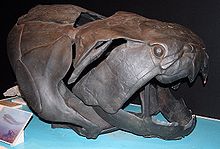| Dunkleosteidae Temporal range: Late Emsian to Late Famennian, ~393.3–358.9 Ma PreꞒ Ꞓ O S D C P T J K Pg N | |
|---|---|

| |
| Dunkleosteus terrelli skull, Queensland Museum | |
| Scientific classification | |
| Domain: | Eukaryota |
| Kingdom: | Animalia |
| Phylum: | Chordata |
| Class: | †Placodermi |
| Order: | †Arthrodira |
| Suborder: | †Brachythoraci |
| Clade: | †Eubrachythoraci |
| Clade: | †Pachyosteomorphi |
| Superfamily: | †Dunkleosteoidea |
| Family: | †Dunkleosteidae Stensiö, 1963 |
| Type species | |
| Dinichthys terrelli Newberry, 1873 | |
| Genera | |
Dunkleosteidae is an extinct family of arthrodire placoderms that lived during the Devonian period. The gigantic apex predator Dunkleosteus terrelli is the best known member of this group.
Phylogeny
While members of Dunkleosteidae were previously thought to be close relatives of the genus Dinichthys (when they were not synonymized as each other) and grouped together in the family Dinichthyidae, more recent phylogenetic studies have shown that the two taxa represent two very distinct clades within Arthrodira. Dunkleosteidae was then established as the sister taxon to the family Panxiosteidae, which together comprised the superfamily Dunkleosteoidea (one of the three major clades of Eubrachythoraci). Dunkleosteidae was thus cladistically defined as including the type genus Dunkleosteus and all other genera in Dunkleosteoidea more closely related to Dunkleosteus than to Panxiosteus.
The phylogeny of Dunkleosteidae from the 2013 Zhu & Zhu study is shown in the cladogram below:
| Eubrachythoraci |
|
Pachyosteomorphi | |||||||||||||||||||||||||||||||||||||||||||||||||||||||||||||||||||||||||||||||||||||||||||||||||||||||||||||||||||||||||||||||||||||||||||||||||||||||||||||||||||||
However, the subsequent 2016 Zhu et al. study using a larger morphological dataset recovered Panxiosteidae well outside of Dunkleosteoidea, leaving the status of Dunkleosteidae as a clade grouping separate from Dunkleosteoidea in doubt, as shown in the cladogram below:
| Eubrachythoraci |
| ||||||||||||||||||||||||||||||||||||||||||||||||||||||||||||||||||||||||||||||||||||||||||||||||||||||||||||||||||||||||||||||||||||||||||||||||||||||||||||||||||||||||||||||||||||||||||||||||||||||||||||||||||||||||||||||||||||||||||||||||||||||
Genera
Dunkleosteus

The type genus, Dunkleosteus, is known from Late Frasnian and Famennian-aged marine strata from Europe, Morocco, and North America. The best known species, D. terrelli, is famous as the "world's first vertebrate apex predator," and is estimated to be up to 6 m (20 ft) in length: other species, however, such as D. raveri, are estimated to be 1 m (3.3 ft) in length.
Eastmanosteus
Eastmanosteous is a diverse genus of medium to somewhat large predatory arthrodires very similar in anatomy to the species of Dunkleosteus. Eastmanosteus differs from Dunkleosteus in having a unique tubercle-ornamentation on the dermal surfaces of the plates, a distinctively shaped nuchal plate, and sutures that are more zigzagging. The best studied species, E. calliaspis may not be of this genus due to its recently appreciated relationship to the Emsian-aged genus Xiangshuiosteus.
Golshanichthys
Fossils of Golshanichthys are found in Frasnian-aged marine strata near Kerman, Iran.
Heterosteus
Heterosteus is from the middle Devonian, found in Europe and Greenland. It is one of the larger members of the family, with an estimated body length of up to 6 metres (20 ft).
Kiangyousteus

This Middle Devonian genus represents the first arthrodire described from China. Fossils are known from the Late Givetian to Early Frasnian-aged Guanwu Formation in Sichuan province.
Xiangshuiosteus
Xiangshuiosteus was originally described as an arthrodire incertae sedis of the Late Emsian with anatomical features suggestive of both buchanosteids and coccosteids. With the reappraisal of Kiangyousteus, it is now thought to be a dunkleosteid most closely related to Eastmanosteus calliaspis.
References
- ^ Carr, R.K.; Hlavin, W.J. (2010). "Two new species of Dunkleosteus Lehman, 1956, from the Ohio Shale Formation (USA, Famennian) and the Kettle Point Formation (Canada, Upper Devonian), and a cladistic analysis of the Eubrachythoraci (Placodermi, Arthrodira)". Zoological Journal of the Linnean Society. 159 (1): 195–222. doi:10.1111/j.1096-3642.2009.00578.x.
- ^ You-An Zhu; Min Zhu (2013). "A redescription of Kiangyousteus yohii (Arthrodira: Eubrachythoraci) from the Middle Devonian of China, with remarks on the systematics of the Eubrachythoraci". Zoological Journal of the Linnean Society. 169 (4): 798–819. doi:10.1111/zoj12089.
- Zhu, You-An; Zhu, Min; Wang, Jun-Qing (1 April 2016). "Redescription of Yinostius major (Arthrodira: Heterostiidae) from the Lower Devonian of China, and the interrelationships of Brachythoraci". Zoological Journal of the Linnean Society. 176 (4): 806–834. doi:10.1111/zoj.12356. ISSN 0024-4082.
| Taxon identifiers | |
|---|---|
| Dunkleosteidae | |







